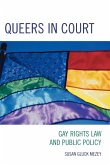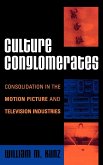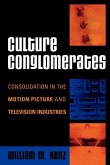In Queers in Court, Susan Gluck Mezey examines the contemporary battle for gay and lesbian rights in the United States, tracing the evolution of issues from same sex marriage and privacy rights to military service and employment discrimination. By combining analyses of nearly three hundred cases from both federal and state courts with detailed explorations of the paths these issues have taken through legislative and executive bodies, she provides the most comprehensive analysis of queer rights in law and policy to date. Both scholars seeking a case study in minority rights and those looking for a primer in gay and lesbian politics will find Mezey's book of interest.
Hinweis: Dieser Artikel kann nur an eine deutsche Lieferadresse ausgeliefert werden.
Hinweis: Dieser Artikel kann nur an eine deutsche Lieferadresse ausgeliefert werden.
Queers in Court is a meticulously researched survey of gay rights cases in state and federal courts over the last fifty years. Susan Gluck Mezey provides a comprehensive and richly detailed reference that is indispensable to understanding the interplay in American policymaking among judges, other legal and political elites, and public opinion. A truly enlightening book. -- Daniel R. Pinello, author of Gay Rights and American Law and America?s Struggle for Same-Sex Marriage I learned a lot from reading Queers in Court, and expect to consult it many times. The book is must reading for students of gay and lesbian politics, but it will also be useful for anyone interested in social movements in the American courts. It provides that rare balance of a broad perspective that still includes all of the details specialists require. -- Clyde Wilcox, Professor of Government, Georgetown University Queers in Court provides a nuanced historical survey that builds on the already-rich scholarly analysis of U.S. judicial rulings on sexual diversity. Susan Gluck Mezey's background in the exploration of rights litigation by other traditionally-marginalized groups allows her to draw parallels to other struggles without ignoring the distinctive features of queer claims. She also punctures some of the myths about American judicial "activism"-pointing to the recurrent restraint of federal courts and of most state courts. This is a healthy response to both overly-optimistic litigants and highly-selective critics who don't want to believe that there are any LGBT claims that have popular support. -- David Rayside, Professor of Political Science and Director of the Mark S. Bonham Centre for Sexual Diversity Studies, University of Toronto I view the book as a welcome addition to a library supporting gay rights research and believe it would be useful to a broader audience of other scholars, activists, and advocates. -- Sharon Whitney Law and Politics Book Review A valuable resource for attorneys and scholars. Booklist, September 28, 2009 Queers in Court is an excellent overview of gay rights litigation in the U.S. It is thorough yet readable. It covers topics ranging from marriage to the military, it covers them over half a century of American history, it appreciates their nuances, and it places litigation in the context of public opinion. Queers in Court would be useful in a college or law school classroom and it would also be good company on a long plane flight. In one volume, it provides a solid, well-rounded, easily-digested introduction to all of gay law. -- William Rubenstein, UCLA School of Law; Founding Director, Williams Institute on Sexual Orientation Law; and Former Director, ACLU Lesbian & Gay Rights Project Overall, the book makes a tremendous contribution to the study of judicial policymaking and to the study of sexuality and politics by chronicling, in great detail, the litigation surrounding important elements of LGBT family life...Mezey has created a tremendous resource of students and cholars of the courts and the study of sexuality. The author has taken great care in analyzing the reasoning of important cases...Overall, this book, particularly combined with Mezey*s QUEERS IN COURT, is an excellent addition to the growing scholarship on law, politics, and policies relating to sexual minorities and presents more evidence why this topic is particularly important for scholars of the judiciary. The Law and Politics Book Review








